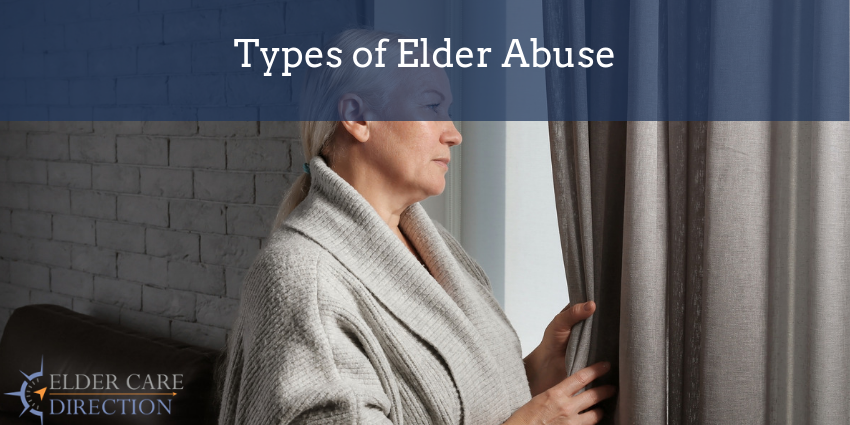Elder abuse is a serious problem that is becoming more frequent. If your loved one is elderly, it is crucial for you to understand what elder abuse is and how to recognize the signs that it might be occurring. It is unclear why some people abuse older adults, but family stresses are believed to contribute to it. At Elder Care Direction, we can help families to access resources for their elderly loved ones and provide referrals to elder law attorneys who might be able to help when family members believe that their loved ones might be suffering abuse.
What is elder abuse?
Elder abuse is the exploitation or poor treatment of older adults. There are multiple forms of abuse of the elderly, ranging from physical abuse to fraud, duress or coercion to take money or valuables from vulnerable, elderly adults.
Physical abuse of the elderly
Physical abuse of the elderly involves using physical force in a manner that is likely to cause pain, injury, or impairment. Common types of physical abuse include beating, striking, hitting, shaking, pinching, pushing, slapping, kicking, or burning. Other types of physical abuse of the elderly include force-feeding, holding an elderly person against his or her will, and excessively using restraints or drugs.
Elderly adults may be easily injured because of their frailty. This means that even minor physical contact might be abusive. For instance, grabbing an older adult’s arm hard enough to leave a bruise can be considered to be abuse if the person who grabbed the older adult did so with the intent to control or harm him or her.
Emotional or psychological abuse
Emotional or psychological abuse of the elderly includes any act that is meant to cause anguish, distress or emotional pain to the elderly adult. Some of the types of emotional or psychological abuse of the elderly include intimidation, threats, humiliation, verbal assaults, insults, treating seniors like they are children, and harassment.
Emotional abuse of the elderly may be verbal or nonverbal. Nonverbal elderly abuse might include isolating an elderly person from his or her family and friends or giving the older adult the silent treatment. Some elderly adults who suffer physical abuse may also experience emotional abuse. For example, an elderly adult who is abused may experience fear.
Sexual abuse of the elderly
Unfortunately, some elderly adults are sexually abused. This includes any sexual contact that is nonconsensual. It also includes sexual contact with an elderly adult when he or she is unable to consent or is too confused to understand what is occurring.
Sexual abuse can include forced nudity, unwanted touching, taking sexually explicit pictures, and all forms of sexual battery and assault.
Neglect of the elderly
Neglect of the elderly occurs when a caregiver fails to provide the care that an elderly person needs. Neglect can occur in nursing homes, care facilities, and individual homes. It can be passive or active. Active neglect occurs when a caregiver intentionally fails to provide care. Passive neglect occurs when a caregiver is no longer able to complete his or her duties because of things like stress or not having access to sufficient resources.
Neglect occurs when a caregiver does not provide a dependent elderly adult with the necessities of life, including water, food, personal hygiene, shelter, medicine, clean clothing, basic comfort, and safety. Neglect may also be a contributing factor to emotional abuse.
Self-neglect
Self-neglect is a type of abuse that does not have a perpetrator. It may happen when an elderly adult endangers his or her own safety or health by not eating, drinking water, or taking medications. It also may include an elderly adult not having adequate hygiene or housing or ignoring safety precautions. An elderly adult who engages in self-neglect is mentally competent but fails to take care of his or her own basic needs. Self-neglect is considered to be a form of elder abuse for referrals to adult protective services.
Financial exploitation of the elderly
Financial exploitation or abuse of the elderly is very common and includes many different acts. Some forms include con jobs, fraud, theft, and other ways of taking money or materials from vulnerable elderly adults. Financial abuse may include the unauthorized cashing of checks, stealing money or possessions, forging signatures, coercing an elderly adult into signing a document, or improperly using a power of attorney, conservatorship, or guardianship.
People who may be perpetrators of financial abuse of the elderly include telemarketers, con artists, and any individual who preys on the vulnerabilities of elderly adults. For instance, elderly adults are much likelier to owe nothing on their homes and are sometimes deceived into signing their deeds over in order to get a payoff in the future that does not come.
Abandonment
Abandonment of the elderly happens when a guardian or caretaker leaves an older adult to fend for himself or herself. It is the complete desertion of the elderly adult. Some examples of abandonment include leaving an elderly adult in a shopping mall or store or otherwise ignoring the responsibilities that the caretaker has to provide care for the older adult.
Get help from Elder Care Direction
It is unfortunate that elder abuse occurs. Family members should watch for signs that their loved one is suffering from abuse. It is common for elderly adults to fail to report their abuse because of fear, confusion, or an inability to make the report. This makes it important for family members to look for bruises and other signs of physical abuse as well as behavioral changes in their loved ones. If a family member is overwhelmed by the care needs of his or her parent, he or she should seek help to find resources for both the caregiver and his or her parent. At Elder Care Direction, we help to link people with the resources that they need for older adults. We can also provide referrals to elder law attorneys if abuse or neglect are suspected.







